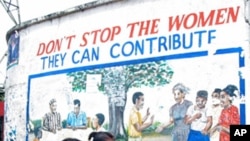While a recent U.S. report has staggering statistics about ongoing mass rapes and domestic violence in the Democratic Republic of Congo, human rights activists say the problem exists across Africa. Our correspondent caught up with African lawyers who are in the United States getting advice on how to confront the situation.
At a meeting in the Washington offices of the U.S. National Network to End Domestic Violence, Rene Renick shared with her African guests some of the common challenges women face in fighting for their rights.
"That is something we have been through too just so you know," said Renick. "We have been told we are breaking up marriages, we have been called lesbians and baby killers."
A report released this week in the American Journal of Public Health, based on new statistics, indicated that between 2006 and 2007, 400,000 women had been raped in the Congo - a rate 26 times higher than what the United Nations has been reporting. The study said these rapes were taking place in conflict areas as well as in the homes of the victims.
Gladys Fri Mbuya from Cameroon said that while many Americans hear only about rape and domestic violence from Africa in the conflict-ridden Congo, she said the problem is rampant across the continent.
"It cannot be just Congo," said Mbuya. "Domestic violence I think is everywhere. And it is more rampant in Africa because of our culture. Basically it is encouraged by some households. You grow up, you see your parents fighting and you grow up thinking that fighting is a normal thing for families. They give the impression that your husband is like your father, he has the right to correct you, he has the right to beat you."
Mbuya takes on many legal cases to protect women, and also hosts a weekly radio show for women's issues on her own time, but she says there is only so much she can do on her own. A new family legislative code has been years in the making in Cameroon, but so far it has yet to be completed.
Mbuya says young women and teenagers are often sold into marriages, which quickly become abusive, and that there is not a single shelter in all of Cameroon, a country of nearly 20 million people.
"You realize that they remain in those relationships because they do not have a way to hide," she said. "They do not know where to run to. They go to their parents, but their parents send them back because of the cultural mindset, they think it is right for your husband to beat you, they keep pushing them back. Some of them have actually expressed that if we knew where to go and hide we would leave this relationship."
Like Mbuya, fellow lawyer and women's rights activist Selamawit Tesfaye is also completing a fellowship at the Georgetown University Law Center.
Tesfaye says in her home country, Ethiopia, which also does not have laws to cover domestic violence, marital rape is a huge, if largely unmentioned, problem.
She says laws which were recently passed in Ethiopia severely restricted outside funding for non-governmental organizations, making it all the more difficult to address the situation.
"Most of the organizations that were working in that area have been rendered ineffective, literally, because most of our funding was coming from there. I am not saying the government is not focusing on those areas but the non-governmental organization expertise has not been replaced so there is a gap at the moment," said Tesfaye.
She said in addition to more funding to help address the problem, more women's representation in governments across Africa could also help.
Paulette Sullivan Moore, vice president of public policy for the U.S. National Network to End Domestic Violence, was one of those giving advice at the Washington meeting.
She compared the plight of women in Africa to the situation several decades ago in the United States when there few laws protecting women, and police were unresponsive to complaints of domestic violence.
"I am not surprised about the current level of struggle," said Moore. "They did not say things that we weren't hearing in this country 25, 30 years ago. So I hope that gives them hope and that they will one day be at a place that they will be helping another country move forward."
Some of the advice at the meeting ranged from compiling precise statistics and starting help websites and hotlines, to striking up partnerships with insurance companies to give loan assistance to at-risk women.
The African lawyers said they were hoping to return to Washington next year when the second world conference of women's shelters will be held from February 27 to March 1, bringing together advocates working to end violence against women from all over the world.
Africa's Domestic Violence, Rapes Extend Far Beyond Congo




